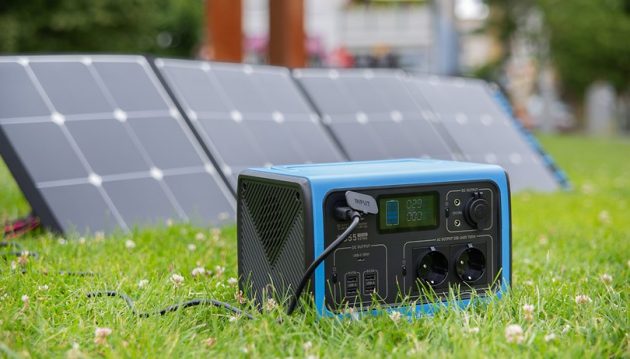Solar-powered generators are an excellent source of backup energy as they can be used to power a wide range of household appliances during power outages and for living off the grid. Compared to traditional gas-powered generators, which are noisy and emit harmful fumes, solar generators are quiet and use a renewable source of energy, thereby reducing the carbon footprint of a household and hence, do not contribute to climate change.
However, selecting the best solar powered generator for a home can be a tricky task in itself. There are several factors you will need to consider if you want to power several appliances in your household. In the following article, we take a look at some of the key factors you will need to consider to select the best solar generator for your house.

Parts of a solar-powered generator
A solar generator is essentially an electric generator that relies on solar panels for collecting and storing electricity. It consists of four main parts:
- Solar panels for collecting solar energy and converting it into direct current
- Rechargeable solar battery for storing the power from solar panels
- Charge controllers for regulating the incoming solar power into the battery, protecting it from overcharging
- Inverter for converting the direct current into the usable alternating current.
Things to consider when buying a solar generator
As with any generator, you will need to ensure that the solar generator that you select is able to keep up with your energy demands and power your devices. Here are some of the key metrics you will need to consider when selecting the best solar powered generator for your home.
-
Running output
Running watts refers to the rated watts measure of the generator, i.e., the continuous wattage that the generator can produce. The best solar powered generator for your household should be able to provide enough running watts to power all your devices effortlessly. You can calculate the required continuous capacity by adding the separate power requirements of individual appliances in your house and adjusting for efficiency losses. Ideally, the rated running watts of the generator should be around twice the continuous output of the inverter.
-
Generator capacity
Rated in Watt-hours (WH), the generator capacity indicates the time for which you can run the appliances off the generator. Watt-hours refer to the continuous power that the generator can provide for 60 minutes with a fully charged battery. For instance, a 500 Wh generator can power a 20W bulb for 25 hours or two 50W appliances for 5 hours, etc. Since these calculations are made under standard regulated conditions, a smart move here will be to keep a slight headroom as you will most likely not be able to extract the entire power due to fluctuating conditions.
-
Peak power
The starting watts measurement, i.e., the peak power is a measure of the brief power output required to start an appliance before settling into running output. Consequently, this measure will be higher than the running watts and you will need to pay close attention to the peak power if you want to run appliances with a motor like refrigerators and fans. The peak power is the wattage required to start such appliances, so you will need to check them individually and make sure that the generator can accommodate this number.
-
Recharge time
As the name suggests, recharge time refers to the time taken for an exhausted generator battery to charge to 100% capacity. Recharge times are usually mentioned on the manufacturer’s documentation and indicate the estimated charging times based on the charging speeds, input from the solar panels, and the battery capacity. If you reside in an area that receives more peak sun hours, i.e., the amount of time for which the sun can deliver 1000W per sq. m. of energy, you can opt for longer recharge times. Cloudy weather will affect the charging times, so you will need to factor this in when selecting the best solar powered generator for your house.
-
Inverter type
Inverters are tasked with converting the direct current into alternating current that is used by appliances. The most commonly used type is a modified sine wave inverter, but you will need to consider the appliances you are planning on using and make sure that they are suited for it to determine the ideal type of inverter. A pure sine wave inverter is expensive but more likely to be compatible with sensitive appliances.
-
Battery type
Most modern-day solar-powered generators use a lead-acid or lithium-ion battery to store energy. Lead-acid batteries are comparatively less expensive than lithium-ion, but lithium-ion batteries last longer. Portable generators use lithium iron phosphate batteries, which are lightweight and hence, portable.
Solar generators vs gas-powered generators
Solar generators offer several benefits over traditional gas-powered generators. Some of these include:
- Solar generators are an eco-friendly alternative to gas-powered generators as they do not rely on fossil fuels for generating power
- The running cost is fairly stable after purchasing a solar generator as there is no need to buy fuel to run these
- These devices are easier to clean and they operate without a mess
- Solar generators are quieter and can be run continuously without becoming annoying
- They do not produce carbon monoxide fumes and can be used on the rooftops and even inside homes
- Since they do not contain moving mechanical parts, the maintenance cost is relatively lower and requires less effort
- They are also lightweight and hence easier to transport
- Portable generators can be used in various scenarios, like for running RV appliances, camping trips, road trips, boating, etc.
Gas generators need refuelling if you want to keep them running for longer durations. With solar-powered generators, there is no utility to fall back on if the solar panels are unable to keep up with your energy demands. So, you will need to conduct thorough research about your energy requirements and then pick the best solar powered generator that can provide you with ample energy to keep your devices running.














